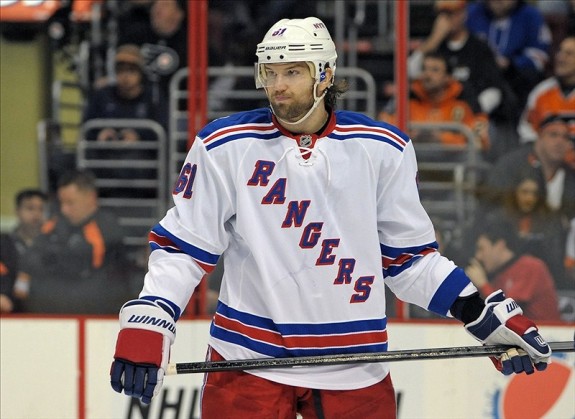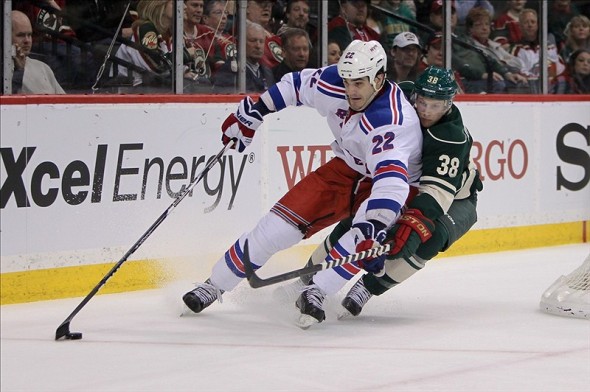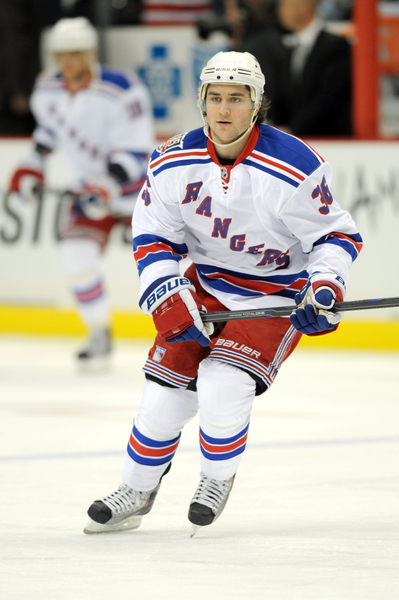The Rangers’ power play is bad, but did you realize just how awful it is? The team’s repeated failures to convert are causing them to lose all momentum and strong penalty kills look to be giving their opponents a spark. What if the Blueshirts are actually worse off on the power play? (Hint: They are.)

Taking a Look at ‘Goals Per 60’
Forget power play percentage. We’re going to look at a statistic that shows the importance of special teams relative to even strength performance – goals per 60 minutes. We’ll look at the power play goals scored compared to the amount of time spent on the power play, then see what it would look like projected over sixty minutes – basically, what would happen if the team could play an entire game on the power play. We’ll do the same thing for even strength situations as a comparison.
At even strength in the regular season, the Rangers averaged 2.46 goals per 60 minutes (goals/60). On the power play, they were much higher, as expected, averaging 5.53 goals/60. That sounds about right. New York scored about twice as often on the power play as they did at even strength, based on the same amount of time.
In the playoffs, they’ve been worse. Much worse.
The Rangers’ power play finished off the regular season at a barely-respectable 15.7%. In the playoffs, they’re converting just 5.6% of their opportunities. That’s not just bad, it’s horrendous. So much so that they would, statistically speaking, be better off not going on the power play.
Rangers Playoff Goals per 60
The Rangers have spent more time on the power play than any other team this postseason, playing 64:14 with the man advantage. That tells us two things. One, they’ve drawn a lot of penalties. The other is the fact that over 94% of those penalties lasted the full two minutes, since the Blueshirts failed to cut them short by doing something crazy like actually scoring a power play goal. Over nine games, they’ve netted only two goals with the man advantage, which works out to 1.9 goals/60. That’s right, a full game on the power play would be expected to get them less than two goals.
At even strength, the Rangers have been better. They’ve averaged 2.3 goals/60 when playing five-on-five.
Yes, the Rangers score nearly half-a-goal less on the power play than at even strength when projected over 60 minutes. (Take your time. I’ll give you a minute to consider how absolutely pathetic that is.)
They even shoot better five-on-five. Their shooting percentage at even strength is a respectable 7.8%. Give them a power play, though, and they forget how to aim. Their shooting percentage drops to just 4.3% – not counting the innumerable times the Rangers miss the net. (I’m looking at you, Michael Del Zotto and Brian Boyle.)

Bruins Playoff Goals per 60
In the postseason, the Bruins are much more in line with what you’d expect from this stat. At even strength, they’re averaging 3.1 goals/60. That jumps to 5.6 goals/60 on the power play, nearly double their five-on-five performance. That’s consistent with the kind of improvement we saw from the Rangers in the regular season, when their efforts were much less embarrassing.
The Bruins have one shorthanded goal in the playoffs. Given the time they’ve spent shorthanded, they’d score 1.2 goals if they played the entire game down a man. Based on how inept the Rangers’ power play is, if the two teams played a game with the Rangers on the power play for the entire 60 minutes, it projects to a final score of 1.9 to 1.2. Even if we round those numbers, that means an entire-game-long power play for the Rangers would still result in them squeaking by with a one goal win. It’d probably take overtime. Depressing, right?

What Can The Rangers Do?
Tortorella has a plan. He always has a plan. (If you don’t believe me, ask him. I’ll kindly leave the room while you do so.) What are his options to address the team’s deplorably bad power play?
Puck Daddy’s Greg Wyshynski boiled it down to addressing the efforts of a few key players, namely Hagelin, Nash, Richards, and Gaborik (or the lack thereof).
The boys from Blueshirt Banter agreed, calling for some fresh blood on the power play. With the way Pyatt and Dorsett have been battling on the boards, why not? And whatever happened to John Moore, who saw only 10:21 of ice – none on the power play – in Sunday’s 5-2 loss?
Over at NYR Full Tilt, they’re also demanding a complete overhaul of the lines, looking for Boyle and Hagelin – even though he stinks – to get more power play time, and to have Zuccarello and Moore quarterback the power play units. (That would leave Brad Richards as this year’s Stu Bickel, riding the pine as he’s done so often. The “star” center’s ice time dropped from over 18 minutes in the regular season down to 15 against the Capitals and now averaging just 10:53 per game against the Bruins.)
Those personel moves are worth a shot, right? Maybe. Or maybe not. Maybe the Rangers need to look at their outright failure with the man advantage and leverage it in a completely different way.
The Rangers Need To Take More Penalties
Hey, Blueshirts, are you listening? Here’s the new plan. From now on, forget about drawing the penalty. Power plays are of no use to you. Use this inadequacy to your advantage. Instead of a two-minute power play, consider it a free shot on your opponent. Lucic hooked you down? Good, now turn around and give him a two-hand slash so you can both go to the box. Get cross-checked in the crease? Return the favor and interfere with Rask. Maybe you score on the delayed call. If not, it’s not like you were going to score on the power play anyway. You may as well get in his head and keep it chippy.
At this point, the Blueshirts need to find some way to make the power play work to their advantage. Perhaps the best way to do that is to avoid any manpower advantage at all. Instead, get physical and get nasty. If you can’t deliver a goal or some offensive output, you need to find a way to deliver something. Carte blanche to rough things up a little might just be an option.
Just don’t put yourselves down a man. The Bruins have actually figured out this whole ‘power play goal’ thing…
Yeppers, getting Nash, Brassard, Dorsett and Moore really helped your play-off push. I’m looking forward to next season when their former teammates expose their weaknesses several times during the regular season.